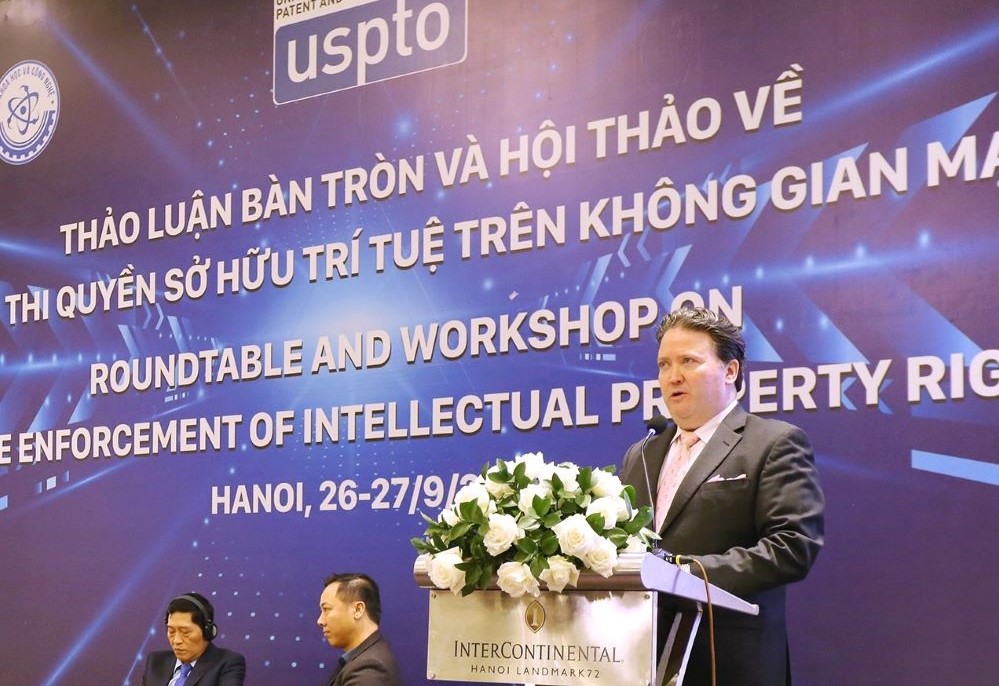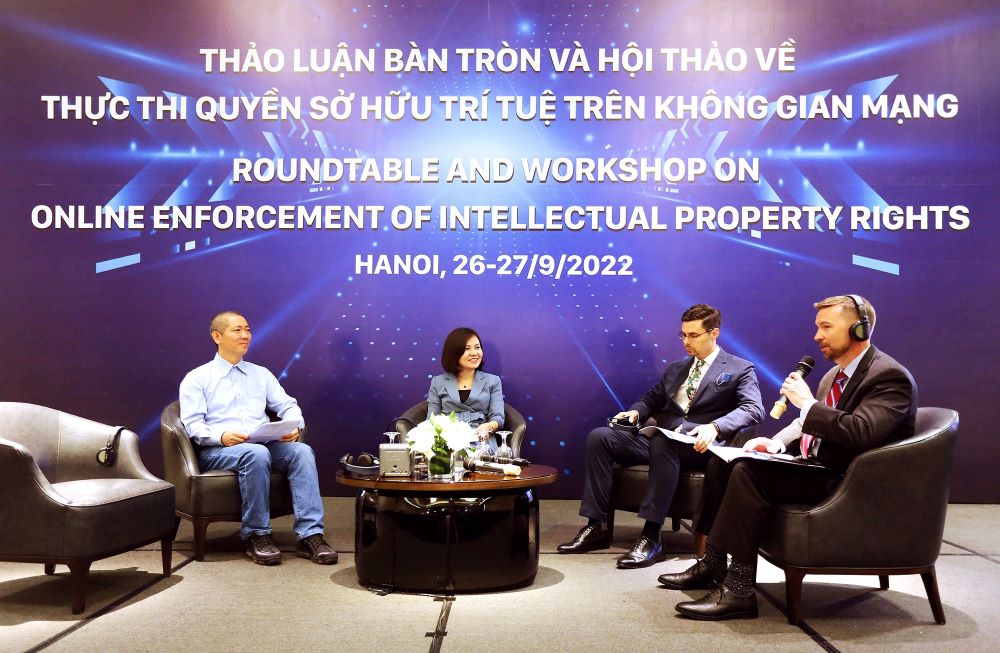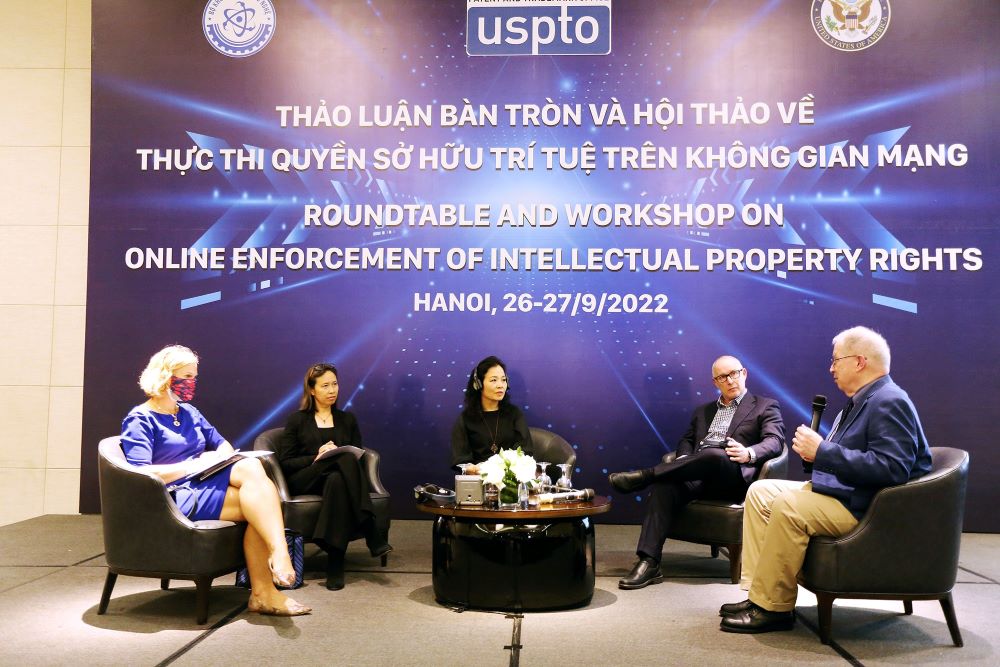IPP matters a lot to economic growth, innovation: US Ambassador
The rise of e-commerce in Vietnam has added new challenges to the fight to protect IPP and the partnership will help.
US Ambassador to Vietnam Marc Knapper shared insight on the role of intellectual property rights (IPP) in fostering economic growth and innovation at a workshop concluded in Hanoi on September 27.
| US Ambassador to Vietnam Marc Knapper addresses the workshop held in Hanoi on Sept 26-27. Photos: Mai Ha |
Over the past few decades, Vietnam has become a manufacturing powerhouse making the world’s top consumer brands to the highest quality standards at an affordable price.
“But Vietnam is also important to US companies as a market as the rapidly growing Vietnamese middle class are increasingly valuable customers, and American companies want to compete for their business,” Knapper said at the event sponsored by Vietnam’s Ministry of Science and Technology (MOST) and the US Patent and Trademark Office (USPTO).
The ambassador listed a number of issues that requires Vietnam’s thorough solutions, including the rise of e-commerce, Vietnam’s moving toward a high-tech, knowledge-driven economy, creative industries and cutting-edge research, and Vietnamese companies’ increasing competition in the global market.
Importance of cooperation
Knapper stressed the importance of cooperation, saying that governments need to provide legal frameworks for intellectual property rights protection, but also effective enforcement when bad actors try to take advantage of someone else’s hard work.
He said that the US is a strong partner for Vietnam on intellectual property rights protections, and the issue draws attention from the highest levels of US leadership.
In mid-September, US Department of Commerce Under Secretary and Director of the US Patent and Trademark Office Kathi Vidal visited Hanoi to reinforce the US continuing interest in collaborating with partners to strengthen intellectual property rights in Vietnam.
Sharing the same idea, Peter Fowler, Senior Counsel for Enforcement, the US Patent and Trademark Office (USPTO), said the adequate use and protection of trademarks is crucial to being able to compete fairly and competitively in foreign markets.
At the event, representatives of MOST, Ministry of Culture, Sports and Tourism (MOCST), Ministry of Public Security (MPS), and Supreme People’s Procuracy (SPP) also agreed that dealing with intellectual property (IP) infringements requires collective efforts, in which support by foreign partners is crucial amid rapid technological change.
Violating IPP on the Internet is “rampant” and “borderless”, according to Nguyen Quang Dung, Deputy Prosecutor General, SPP.
Infringements are becoming more well-planned, and they don’t just involve foreigners and their associates in Vietnam. Criminals tend to be highly skilled and knowledgeable individuals who are assisted by cutting-edge science and technology, he said.
He noted that the more complex the offense, the more challenging it is to identify and address, having a major negative impact on the legitimate rights and interests of right holders, investors, and the economy.
In recent years, counterfeiters and pirates often sell their products through social media. Violators have preferred to switch from conventional marketing and distribution to online sales pages and websites, particularly shopping sites and social networks like Facebook and Zalo.
It prompted a question on the need to protect trademarks. Peter Fowler said from the standpoint of both patents and trade secret protection, these are critical to high-tech development and investment in research and development.
“Foreign companies that are looking to invest in high tech sectors and want to do research and development in Vietnam, are going to look to things like how strong the trade secret laws are in Vietnam because that’s crucial to their success and their investments,” he stated.
| Nguyen Nhu Quynh (C), Chief Inspector, MOST’s Inspectorate Department, and US representatives at the workshop. |
Vietnam’s legal system against IP infringements
Both MCST Deputy Minister Doan Van Viet and Nguyen Nhu Quynh, Chief Inspector, MOST’s Inspectorate Department, said that Vietnam’s legal framework is quite well-prepared to meet requirements on IPP protection in the context of further integration.
On June 16, 2022, the National Assembly approved revised law on IPP which will take effect on January 1, 2023. The revised law covers copyrights and related rights and protection of those rights in the online environment.
Particularly, the country has made efforts to protect copyrights by adopting international treaties.
On February 17, 2022, Vietnam became a member of the WIPO Copyright Treaty (WCT), a special agreement under the Berne Convention that deals with the protection of works and the rights of their authors.
On July 1, 2022, Vietnam joined the WIPO Performances and Phonograms Treaty (WPPT), which deals with the rights of two kinds of beneficiaries (performers and producers of phonograms), particularly in the digital environment.
Notably, Vietnam has made strides in raising awareness of the IP system and developing it and has pledged to enforce its IP commitments in its international agreements, MOST Deputy Minister Tran Van Tung spoke at the roundtable.
He said Vietnam’s IP system is anticipated to significantly advance with the adoption of the Intellectual Property Strategy through 2030, acting as a catalyst for innovation and the spread of artistic works.
The regulatory system’s practical programs have shown Vietnam’s commitment to implementing free trade agreements (FTAs), including CPTPP and EVFTA, he noted.
| Ngo Phuong Lan, Chairwoman of the Vietnam Association of Film Promotion and Development (3rd from left) and Peter Fowler, Senior Counsel for Enforcement, the US Patent and Trademark Office (USPTO) (1st right) at the event. |
Solutions
According to Nguyen Quang Dung, Deputy Prosecutor General, SPP, punishments for IP violations and counterfeits are heavy as part of Vietnam’s efforts to protect both domestic and foreign products traded in the country.
A representative from the MPS said it requires agencies to complete the regulatory framework on IP with a focus on the online environment and stricter punishments for violators; make collective contributions; strengthen international cooperation, especially transborder efforts; and improve awareness of IPP.
Echoing Dung, Ngo Phuong Lan, Chairwoman of the Vietnam Association of Film Promotion and Development, highlighted the role of collaboration among domestic stakeholders as well as foreign partnerships.
Among measures, Vietnamese officials stressed the importance of effective handling of violations to regain investors’ trust.
“I think as things progress and keep changing, it’s got to put more of an emphasis on patent protection and trade secret protection as Vietnam positions itself to attract higher levels of investment in desired sectors,” Peter Fowler stressed.














